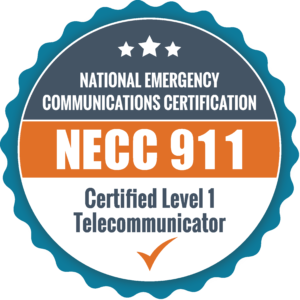
The National Emergency Communications Certification is the online knowledge and simulation lab skills exam that follows the 10 Unit 9-1-1 Academy based on The 9-1-1 Emergency Communications required hardcopy textbook.
History: NECC was created for 9-1-1 career education by a coalition of U.S. and Canadian professional 9-1-1 educators, and PTC Professional Testing Corporation of NY.
What does your state require for 9-1-1 standards/certification?
The only certification:
1. Created FOR 9-1-1 career
education, others are not.
2. More convenient.
Completely online sign in.
3. Affordable – $25 for
students.
4. Immediate scores sent to students and
Certificates printed by Instructors.
5. NO annual re-certs are
required for teachers.
6. Self-study quizzes
on each unit.
9-1-1 Certification True or False:
T/F A 9-1-1 Certification will ensure a student will gain a position at a Comm Center
False of course. A certification is quite simply this – “You take XYZ course of study and pass XYZ exam and you are XYZ certified.” To gain employment in a 9-1-1 center involves a series of challenges and no required certifications. NECC is the certification we offer to teachers at no cost with the simulator. APCO and IAED cost to have the instructor sent to a class and yearly updates and students very costly. These were created for Comm Center working personnel, not colleges and high schools. Someday maybe the Feds or the States will mandate candidates to have a certification but then the Feds or States would need to provide the training and that isn’t likely for some time.
T/F There is only one 9-1-1 Certification that is ‘recognized’
False of course. Define recognized! APCO and IAED are the certifications most widely used and which agency uses which is quite random. These certifications are for working Telecommunicators. NECC was created by a coalition of 10 professional educators FOR college and High School courses and instructors.
T/F Certification is good for colleges and high schools
True of course. Most colleges and high schools I have worked with need the curriculum because certification offers structure, material and exams. Some require the instructor to become certified to teach the curriculum. Training is good.
T/F Your program has choices on which certification to purchase
True. The path you take towards certification is up to you and it is not mandatory to have certification in this profession. However, if your administration requires this or is agreeable to spend the money for certification YEA. Now which to choose/ It’s important to study the different certifications. Cost? Length of course? Requirements for teacher? Time required? Student manuals or process? Flexiblity? Process? User friendly? We suggest you take -or look over- the final exam to determine IF this is the information you will be able to teach in the time you have.
T/F NECC is not recognized in the 9-1-1 industry
False and True. Define recognized. Not recognized because it’s new could be true as in, “I haven’t heard of NECC.” No one can challenge the ‘credentials’ of NECC. Created by a coalition of 10 professional educators in 9-1-1 and PTC of NY, NY (same as NENA) because there was no exam for high schools or colleges. Comm Centers welcome ANY certification as generally their candidates have zero.
T/F 9-1-1 Certifications basically are all the same.
False. NECC is the only certification that requires a lab skills exam and the written exam is online. Others do not and are not. Other certifications require re-certification – NECC does not. NECC is affordable at only $25 a student. Others costs vary. Be sure to know all the facts before you make a decision on which certification to use. Know that what students need the MOST is to build skills and a portfolio that will help them move to the top of the candidates and any certification is a good thing to have regardless.
“I found the test to be a very good overall assessment of what an emergency telecommunicator generally needs to understand in order to be successful. Public Safety Joint Communications. I absolutely think this is a great tool for testing someone being released from training”.
– Virginia Smelser, RPL Communications Manager/911 Director
